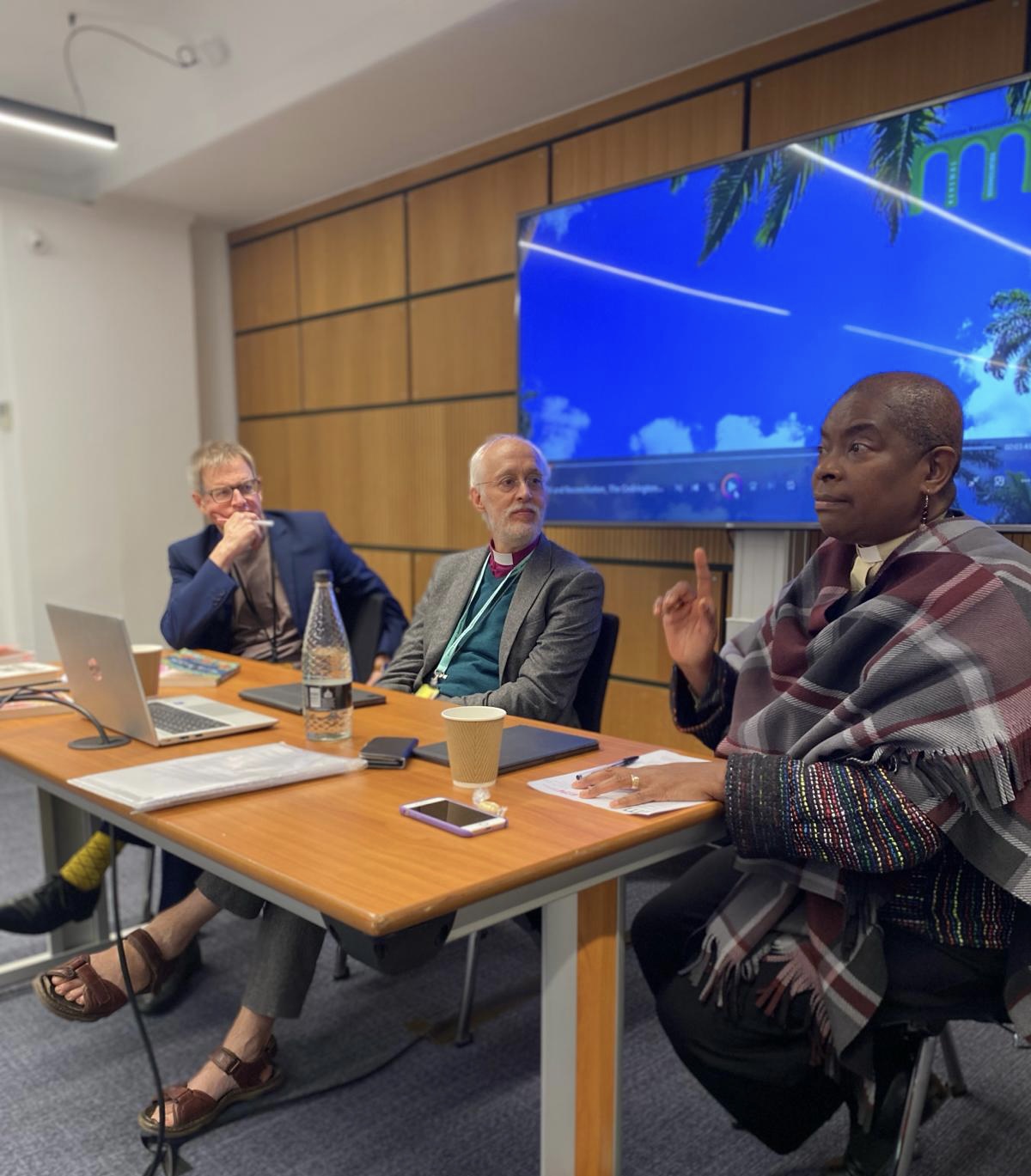On Saturday 24 February 2024, over twenty members of the Church of England’s General Synod gathered at USPG’s fringe event The Road to Reparative Justice: How does the Church respond to its historic links to chattel slavery? A panel consisting of Rt Rev’d Dr David Walker, Bishop of Manchester, Rt Rev’d Rose Hudson-Wilkin, Bishop of Dover, and Rev’d Dr Duncan Dormor, USPG General Secretary, united to discuss the response from the Church regarding its historic links to slavery.
Duncan Dormor opened the event by outlining the commitment USPG has made to reparative justice through its project, Renewal and Reconciliation, launched in Barbados in September 2023. He stressed the importance of taking full responsibility as an organisation for the past actions of the Society of the Propagation of the Gospel’s stewardship of the estate (SPG – former name of USPG). This involved making a deep commitment to truth-telling based on undertaking research regarding its past ownership of the Codrington Estate and the atrocities inflicted upon enslaved African men, women and children between the years of 1710 – 1838, expressing deep lament for the past and taking reparative action to build a more just future. This critical examination of its past led to an unreserved apology, but also a growing sense of the importance of active and reparative justice.
He noted that USPG are very much at the beginning of this journey of reparative justice and reconciliation and at the same time the Church of England is also undertaking its journey through the work of the Church Commissioners, similar organisations, and individual dioceses. He stressed how reflecting on our shocking and distressing past and the complicity of the Church within it can be deeply uncomfortable. USPG acknowledges that repair and restitution are ultimately not possible because we cannot make amends to those who were historically enslaved, those directly affected. Despite this, lamenting our past and working with communities that still feel the impact of slavery is now of utmost importance to USPG. He added, “The journey that USPG is undertaking is a spiritual journey: it is one of lament, of humility, of learning amongst other things. We wish to stand up and take our place, to add our voice to those calling for reparative justice”.

Rt Rev’d Rose Hudson Wilkin speaking at the panel event.
Rt Rev’d Rose Hudson Wilkin commended USPG for recognising the need for this work to be undertaken and affirmed that repentance and action is the right path to pursue. She said when approaching work such as this that it is important to consider four areas – recognition/acknowledgement, lament, engagement and finance. She stressed that despite people saying, “It happened so long ago”, “it wasn’t us”, and “society wouldn’t allow us to behave in that way today” that this is not correct. “The path to recognition means that we must tackle openly that what happened was a crime against humanity… we must also understand that we are still living into what has happened”.” she said. Continuing, “I am pleased USPG used the word lament because lament goes so much further than apology. It is a deep lament that we engaged in the dehumanisation of black people and we continue to engage in the structures in which we work… it also means we must be sorry to God for committing these crimes against his creation”.
Panel member Rt Rev’d David Walker, who will undertake his new role of USPG Chair of Trustees in July 2024, spoke about how his experience of previously working on the Church’s historic links to Transatlantic Slavery with the Church Commissioners has led him to accept the new position at USPG: “I know how it feels for USPG to grapple with a difficult past. And they are staring the past in its face, not turning their back on it, and that’s where we can make a difference…The impact of what we did, the impact of our theologies and ideologies that one ethnic group is lesser than the other lives on and impacts today. And that is why this work is important”.
The session closed with an open Q&A session for all those present.
Learn More:
Online Exhibition: Read more about SPG’s / USPG’s past
Why now? - Video
